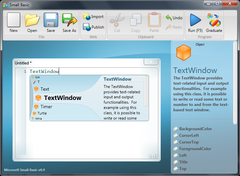- Microsoft Small Basic
-
This article is about the Microsoft programming language. For the GPL programming language, see SmallBASIC.
Microsoft Small Basic 
Small Basic running on Windows 7Original author(s) Microsoft DevLabs Developer(s) Microsoft DevLabs Initial release 2008 Stable release Microsoft Small Basic v1.0 / 12th July 2011 Written in Microsoft .Net 3.5 Operating system Microsoft Windows Platform Microsoft Windows Type Integrated development environment Website http://www.smallbasic.com/ Microsoft Small Basic is a simplified variant of the BASIC programming language introduced by Microsoft in October 2008. With a bare minimum of concepts, Microsoft accredits this as an easy programming language for beginners to grasp. The language itself has only 14 keywords[1], and the environment is beginner-friendly, with a straightforward interface. Small Basic Version 1.0 (12 June 2011)[2] was released with an updated Microsoft MSDN website that included several new Small Basic guides for beginners through a partnership with ComputerScienceForKids.com. The published Small Basic guides include a complete Developer's Reference Guide, a Beginning Small Basic tutorial, and a republished classic programming book by David H. Ahl[3].
Microsoft Small Basic was designed by Microsoft DevLabs and released as a Technology Preview[4] in October 2008. Its intended audience is anyone looking to begin programming, including children and beginner adults as well.
Contents
Language
The actual language is a modified version of Microsoft's QBasic language, but ported over to the .Net Framework. The traditional 'Hello World' can be written as:
TextWindow.Write("Hello World")
or:
TextWindow.Writeline("Hello World")
The first example just writes 'Hello World', but the second example writes 'Hello World' on a new line.
Note that traditional Basic variants, including Microsoft QuickBasic, used an easier syntax:
print "Hello World"
The language itself is Turing complete and supports concepts like conditional branching and loops. Variables are typeless and dynamic, and there are no scoping rules. The language supports subroutines and the runtime uses them for event handling purposes.
Conditional Branching
TextWindow.Write("Enter the temperature today (in F): ") temp = TextWindow.ReadNumber() If temp > 100 Then TextWindow.WriteLine("It is pretty hot.") ElseIf temp > 70 Then TextWindow.WriteLine("It is pretty nice.") ElseIf temp > 50 Then TextWindow.WriteLine("Don't forget your coat.") Else TextWindow.WriteLine("Stay home.") EndIf
Looping
TextWindow.WriteLine("Multiplication Tables") table = 4 For i = 1 to 10 TextWindow.WriteLine(i + " x " + table + " = " + table * i) EndFor
Libraries
The software ships with a built in set of libraries which are quite modern and intended to pique the learners' interest.
For example to change the desktop wallpaper to a variety of 10 mountain photos, the students would make use of a prebuilt "GetRandomPicture" method for Flickr so the code becomes simply:[5]
For i = 1 To 10 pic = Flickr.GetRandomPicture("mountains") Desktop.SetWallPaper(pic) Program.Delay(10000) EndFor
Turtle
Microsoft Small Basic ships with a Turtle graphics library that borrows the idea from Logo. For example, you can make the turtle draw a square by simply saying:
For i = 1 to 4 Turtle.Move(100) Turtle.TurnRight() EndFor
Older Basic dialects, like Microsoft QuickBasic, did not use
EndFor
but
Next iTesting
The first trials were successfully done with several middle school children, most of them children of workers at Microsoft. Small Basic was also successfully tested using a hands-on lab approach to a group of 25 high school girls.[6]
See also
- RoboMind
- SmallBASIC
- Scratch (programming language)
References
- ^ Microsoft Small Basic Home Page
- ^ Small Basic 1.0 Released
- ^ Small Basic Programming Books
- ^ About DevLabs
- ^ Microsoft corporation 2009 Getting Started Guide for Small Basic, p 58
- ^ The Basics of Small Basic
External links
- Official Site
- Small Basic Programming Tutorials For Kids & Adults by Kidware Software & Computer Science for Kids*
- The Basics of Small Basic discussion with Vijaye Raji and Erik Meijer on SmallBasic*
- Introduction to Small Basic discussion with Vijaye Raji and Robert Hess on SmallBasic*
- Microsoft Small Basic for .NET Review of Microsoft Small Basic, with sample application
- Teaching Kids Programming with Microsoft SmallBasic Lessons for children using Microsoft Small Basic
Categories:- BASIC programming language family
- Microsoft BASIC
- Educational programming languages
- .NET programming languages
Wikimedia Foundation. 2010.
